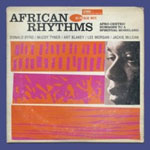Home » Jazz Articles » Album Review » Various Artists: African Rhythms: Afro-Centric Homages t...
Various Artists: African Rhythms: Afro-Centric Homages to a Spiritual Homeland
The 1960s was a decade in which growing numbers of African-American musicians acknowledged Africa as a spiritual homeland, and dashikis and African-inspired prints replaced mohair suits on the hipper bandstands. Africa became a symbol of strength and self-determination, and it's no coincidence that practically all the music on African Rhythms is fast-paced and assertive, a hard bop warrior charge.
Some of the connections with the continent, however, are pretty tenuous, in several cases starting and ending with the track title. Trumpeter Lee Morgan's "Afreaka," for instance, is no more overtly African in instrumentation, rhythm or melody than anything else Morgan recorded for Blue Note—and drummer Art Blakey recorded the same tune as "Mission Eternal."
Sometimes the connections extend past the title to the instrumentation. Specialist drummers and percussionists are featured in several bands. But even here the connection is more metaphorical than literal—the drummers and percussionists, and their rhythms, are variously Afro-Cuban, African-American or Brazilian, and never passport-bearing African.
Blakey once told a journalist that he'd spent much of 1948 in West Africa, researching indigenous music. There is some doubt that the trip actually took place. But to get hung up on such exactitude—either in relation to Blakey's story or to the music on African Rhythms—is to miss the point. Hard bop was, anyway, in large part African-derived and what many musicians were doing was simply emphasizing the importance they attached to African roots.
Does the bureaucratic nationality of the conga player Big Black on Freddie Hubbard's "Cunga Black" really matter? Or those of the percussionists on Blakey's "Abdallah's Delight"? Of course not.
The real African deal here is two tracks from Nigerian-born Solomon Ilori and his Afro Drum Ensemble's African High Life (Blue Note, 2006). The 12-minute "Gbogbo Omo Ibile (Going Home)," recorded in 1964 but unreleased until its inclusion on the 2006 edition of that album, features Donald Byrd and drummer Elvin Jones alongside a deep-African drum section. It's an early taste of the astral-jazz of saxophonist Pharoah Sanders and harpist Alice Coltrane which was to emerge a few years later—and, like most of African Rhythms, is enduringly wonderful music.
Track Listing
CD1: Africaine (Art Blakey & The Jazz Messengers); Man from Tanganyika (McCoy Tyner); Afreaka (Lee Morgan); Appointment in Ghana (Jackie McLean); The Feast (Art Blakey); Black Nile (Wayne Shorter); Home is Africa (Horace Parlan); Safari (Horace Silver); Yaba E (Solomon Ilori and his Afro Drum Ensemble). CD2: Kofi (Donald Byrd); Angola (Wayne Shorter); Mr Kenyatta (Lee Morgan); Gbogbo Omo Ibile (Going Home) (Solomon Ilori and his Afro Drum Ensemble); Cunga Black (Freddie Hubbard); Swahili Suite (Blue Mitchell); Ghana Spice Pt.1 (Candido); Abdallah's Delight (Art Blakey).
Personnel
Various Artists
variousBands led by Art Blakey, McCoy Tyner, Lee Morgan, Jackie McLean, Wayne Shorter, Horace Parlan, Horace Silver, Solomon Ilori, Donald Byrd, Freddie Hubbard, Blue Mitchell, Candido.
Album information
Title: African Rhythms: Afro-Centric Homages to a Spiritual Homeland | Year Released: 2008 | Record Label: Blue Note Records
< Previous
It's Happenin'
Comments
About Various Artists
Instrument: Various
Related Articles | Concerts | Albums | Photos | Similar ToTags
Concerts
For the Love of Jazz
 All About Jazz has been a pillar of jazz since 1995, championing it as an art form and, more importantly, supporting the musicians who create it. Our enduring commitment has made "AAJ" one of the most culturally important websites of its kind, read by hundreds of thousands of fans, musicians and industry figures every month.
All About Jazz has been a pillar of jazz since 1995, championing it as an art form and, more importantly, supporting the musicians who create it. Our enduring commitment has made "AAJ" one of the most culturally important websites of its kind, read by hundreds of thousands of fans, musicians and industry figures every month.




















